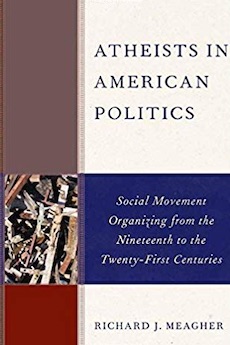By Louis J. Kern
Meagher offers an historical, philosophical, and political consideration of the non-theisitc tradition in America. A political scientist, his primary interest is in how contemporary circumstances and dominant belief systems limited the development of effective political organization, prevented the realization of the goals of and impeded the effective development of an atheist identity.
The book is divided into two parts: the first deals with the free-thought movement of the nineteenth century and ends with the emergence of the unqualified atheism of Madalyn Murray O’Hair (1960s). The second deals with the conflation of atheism and communism in American culture from the establishment of HUAC in 1938 and the further development of atheism in contemporary America.
Meagher focuses on two periodicals—The Free Thinker (1873-present) and The Index (1870-86)—effectively ignoring the seminal period of rationalist anti-theism. Between 1825 and 1850 thirty-three free thought journals were published, among them Robert Dale Owen’s Free Enquirer and The Boston Investigator, edited (1831-39) by Abner Kneeland, the last man convicted of blasphemy in the U.S. The Skaneateles Community, a Fourierist, utopian, free-thought society was established in 1843. Post-1848 German freethinkers established two dozen communities in the 1850s.
While recognizing that nineteenth-century skeptics were no longer Enlightenment rationalists, Meagher misconstrues the nature and scope of secularism in this period. Its roots grew from dissatisfied religious liberals—Unitarians and Universalists as well as Transcendentalists. Meagher disparages their lack of unified focus on atheism, ignoring the fact that only a small minority were full-blown atheists. Free thinkers associated with a wide range of social reforms ranging from imprisonment for debt, socialism, temperance, the ten-hour day, peace, women’s rights, marriage and sexual reform, spiritualism, and free speech. Many of these reform movements also promoted secularism and separation of church and state. Consequently, Meagher misses connections with periodicals of sex radicals like Ezra Heywood’s The Word and Moses Harman’s Lucifer, the Light Bearer.
In the second part Meagher explores the beginning of a more activist political stance by Madalyn Murray O’Hair. More effective political techniques are employed by non-believers—picketing, letter-writing campaigns, professional lobbying, an effective use of media—under Rebecca Watson (“Skepchick”) a blogging presence and under Hemant Mehta (“the Friendly Atheist”) podcasts and YouTube videos. In 2002 atheists mounted a Godless March on Washington. Targeted marketing evinced wider recognition of the atheist community—EvolveFish and Be Secular offered stickers, buttons, t-shirts, etc. Meagher underscores the effective ways in which atheists have adapted the tactics of earlier groups demanding recognition and condign expansion of civil rights—the Civil Rights Movement, the Women’s Liberation Movement, and Gay Rights.
But he underplays the extent to which a scorned minority (about 5% of Americans today) has been concurrent with broader culture—atheists shared its racist, anti-Semitic, and anti-immigrant biases (1825-1920). At the same time, they allied themselves with other excluded minorities—sex radicals, free speech crusaders, and birth control advocates. They also tactically allied with religious groups—the Unitarians, the Seventh Day Adventists, and Jews.
Meagher expresses cautious optimism about the political future of atheism, but the movement’s political success would seem to lie in a wide-ranging, poly-vocal agenda with a national focus, alliance with broader liberal networks, and cooperative ventures with those who share its wider social and cultural goals (Planned Parenthood, the Union of Concerned Scientists, the Sothern Poverty Law Center, etc.) and perhaps modeling the most broadly successful political minority in American politics—fundamentalist Christians’ colonization of the New Right.
Meagher’s text is thought-provoking, but its limited scope and misconstruction of the historical context of free thought make it more of a narrative than an analytical account of the political development of atheist activism.
Louis J. Kern (ΦBK, Clark University,1965) is professor emeritus of history at Hofstra University. Hofstra University is home to the Omega of New York chapter of Phi Beta Kappa.
N.B. While editorial standards have dramatically declined over the past three decades, I am usually not bothered by a few scattered errors in a text. In this case, however, the Spellcheck editing is annoyingly and egregiously frequent—omitted words, orthographic and grammatical errors, and incorrect words abound. These errors are less attributable to the author than to a lax and inattentive editorial oversight doubtless overly dependent on computerized algorithms. I note that Lexington Books has been compared to Edwin Mellen Press, a vanity publisher, which may explain the careless editing. See the Chronicle of Higher Education “Forum” for September 2010. —L.J.K.




